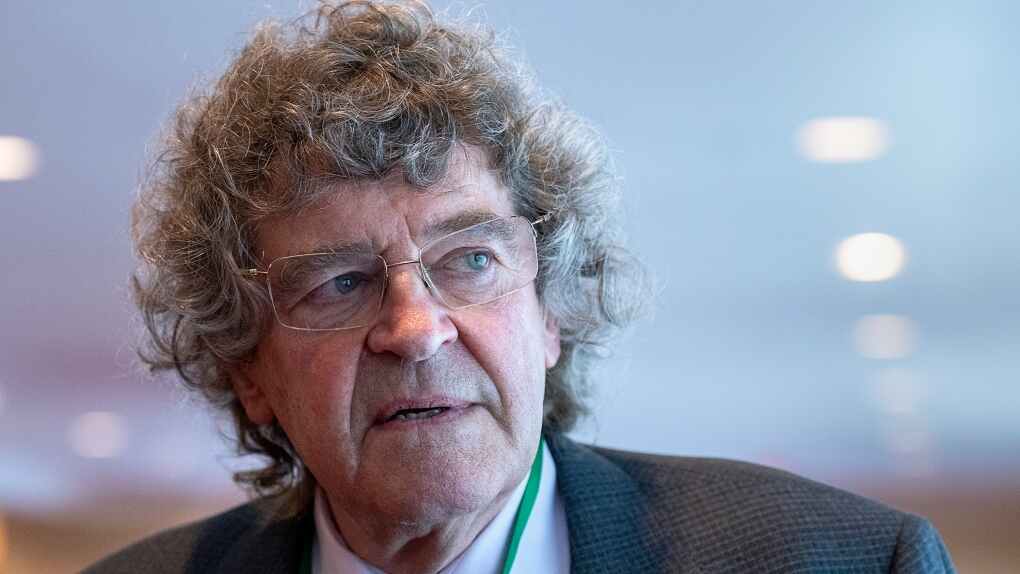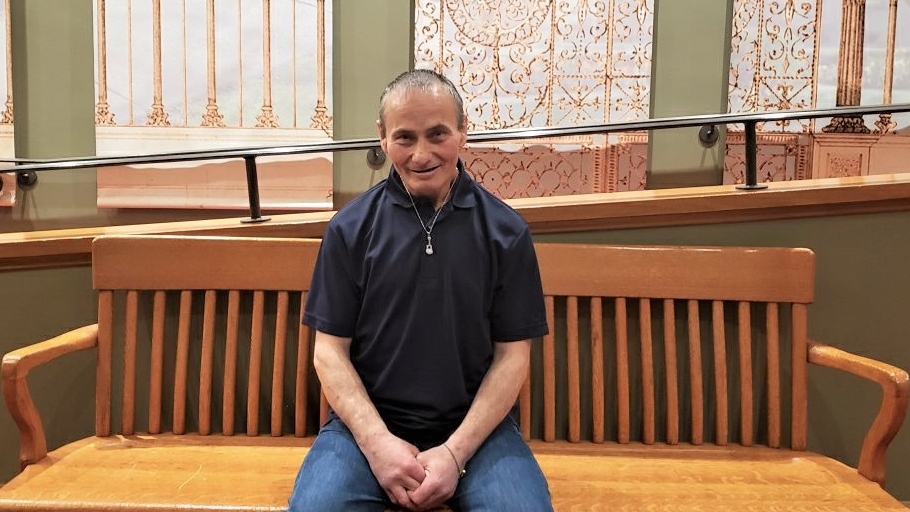Man convicted of Ontario toddler's death exonerated nearly 30 years later
Nearly three decades after being convicted of killing his partner’s toddler, Bernard Doyle has won the legal battle to clear his name.
On Monday, Ontario's Court of Appeal acquitted Doyle, 50, of manslaughter charges in the 1996 death of 17-month-old Tyler Cunningham, which he served three and a half years in a maximum-security prison for.
"The justice system has worked for me at last," Doyle said in a statement issued after the decision. "But I will never forget Tyler. He was a wonderful boy who had lots of promise."
Tyler died while in Doyle's care in a Cambridge, Ont. apartment in August 1996, according to the agreed-upon facts in court documents reviewed by CTV News Toronto. Ten days later, Doyle was arrested and charged with manslaughter.
The conviction of Doyle relied, in part, on evidence provided by disgraced pathologist Charles Smith. In 2011, Smith, the head forensic pathologist at Toronto's Hospital for Sick Children from 1982 to 2003, was stripped of his medical license after the court found his "misguided testimonies on child deaths sent several innocent people to jail."
In its reasoning, the court said Doyle's conviction was "another in the long list of wrongful convictions brought about in part by the unreliable expert evidence of [the] disgraced pathologist."
 A television camera looks out over the Ontario Court of Appeal in Toronto, Wednesday Jan. 31, 2007. (CP PHOTO/Adrian Wyld)
A television camera looks out over the Ontario Court of Appeal in Toronto, Wednesday Jan. 31, 2007. (CP PHOTO/Adrian Wyld)
In 2008, Doyle's case was one of over 200 re-examined as part of a federal review into previous convictions citing shaken-baby syndrome deaths. The review was ordered in “light of [new] understanding of evolving science” and in the wake of questions on the validity and impacts of Smith’s testimonies.
When Tyler died, Doyle was alone with him, according to agreed-upon facts. Doyle’s lawyer told the appeal court the man had been dancing with Tyler in his arms when he tripped, and the pair fell onto building equipment left on the floor. Tyler sustained injuries, largely to his head, according to evidence provided to the court, and was taken to hospital where he died the next day.
During Doyle’s trial, experts, including Smith, suggested the child’s injuries were likely caused by a combination of shaking and blunt-force trauma and largely dismissed the idea that a fall could be to blame, court documents state.
Doyle, 23 at the time, did not testify at his trial. A jury convicted him in 1997 and he was sentenced to four years in jail, four months of which he had already served while awaiting trial. He served the entirety of his sentence.
In 2014, high-profile criminal lawyer James Lockyer took on Doyle's case, alongside another mother who'd been convicted of manslaughter in her child's shaken-baby death, launching appeals for both clients.
 James Lockyer, now Doyle's lawyer, attends a past session at the Mass Casualty Commission inquiry into the mass murders in rural Nova Scotia on April 18/19, 2020, in Halifax on Thursday, July 14, 2022. THE CANADIAN PRESS/Andrew Vaughan
James Lockyer, now Doyle's lawyer, attends a past session at the Mass Casualty Commission inquiry into the mass murders in rural Nova Scotia on April 18/19, 2020, in Halifax on Thursday, July 14, 2022. THE CANADIAN PRESS/Andrew Vaughan
Monday’s acquittal was based on a review of fresh evidence from four new experts, reviewed by CTV News Toronto. A neuropathologist, a biomechanical engineer, and two forensic pathologists agreed that a “complex fall” could indeed explain the injuries, according to their court submission.
In an affidavit submitted to the appeal court by Doyle in April 2022, 27 years after his conviction, he stated he had done nothing to cause Tyler’s death other than “trip and fall on him.”
He also recounts a three-hour interview with police in which he alleges he was told he had “shaken Tyler to death” and that he eventually “gave in” to those accusations, the document reads.
In its Monday decision, the court deemed that interview "a gruelling interrogation" which "reflected several abusive techniques."
“I have regretted that since this day,” Doyle said in his affidavit. “I was a young man and I was scared.”
"For the months I knew Tyler, I loved him,” the affidavit continued. “I felt responsible for his death because I was holding him when I fell, and he died. However, it was an accident.”
Crown lawyer Michael Bernstein agreed to admit the fresh evidence but asked the court Monday for a stay of proceedings rather than a clearing of the charges.
Ultimately, the judge ruled with Lockyer and Doyle, acquitting the now-50-year-old of the manslaughter charges.
 Bernard Doyle can be seen at Osgoode Hall on June 12 (Handout by the Innocence Project)
Bernard Doyle can be seen at Osgoode Hall on June 12 (Handout by the Innocence Project)
Doyle’s case is among many Lockyer has successfully helped to fight that produced a conviction based on wrongful evidence. Since 1992, much of his practice has been spent fighting wrongful convictions, including the high-profile case of David Milgaard, a Canadian man wrongfully convicted of rape and imprisoned for 23 years who dedicated his life post-incarceration to justice activism.
CTV News Toronto has reached out to Lockyer for a statement on the decision but did not receive a response by publication.
In February, the federal government tabled the 'David and Joyce Milgaard Law,' a bill that, if passed, would see an independent commission established to review, investigate and decide which criminal cases should be sent back to the justice system.
CTVNews.ca Top Stories

Parts of Canada could see the Northern Lights on New Year's Eve. Here's where you could see
While fireworks have become a popular way to celebrate the arrival of the new year, many Canadians could be treated to a much larger light display across the night sky.
Ottawa family returns home after chaotic Costa Rica trip
After spending almost 48 hours longer than intended in Costa Rica, the Sachs family has finally returned home.
BREAKING 'Dangerous person alert' ended as police locate dead suspect in Calgary double murder
The suspect in a double homicide that took place in Calgary on Sunday night has been discovered dead by police.
More than US$12M worth of jewelry and Hermes bags stolen from U.K. home
Police are searching for a burglar who stole more than £10 million ($12.5 million) worth of bespoke jewelry in north-west London in what is thought to be one of the biggest thefts from a British home.
Border agents seize $2M worth of cocaine bound for Canada at Coutts
Authorities at the Coutts, Alta., border crossing seized 189 kilograms of cocaine, with an estimated value of about $2 million, that was being shipped into Canada.
Matthew Gaudreau's widow welcomes their first child months after his death
Four months after his death, the widow of Matthew Gaudreau announced the birth of their first child. Gaudreau, 29, and his NHL star brother Johnny Gaudreau, 31, were killed after being struck by a driver in August.
'McDonald's wouldn't open': Here are B.C.'s 10 worst 911 nuisance calls of the year
What do overripe avocados, stinky cologne and misplaced phones have in common? Generally speaking, none of them warrant a call to 911.
Man who peed on B.C. RCMP detachment injured during arrest, watchdog says
A police watchdog is asking witnesses to come forward after a man who allegedly peed on a B.C. RCMP detachment "sustained an injury" during his arrest.
opinion Tom Mulcair: Grading Trudeau's performance in 2024, and what's ahead for him in the new year
Prime Minister Justin Trudeau is about to enter the final year of his mandate and, quite possibly, of his political career, writes Tom Mulcair in his column for CTVNews.ca. The former NDP leader takes a snapshot of Trudeau's leadership balance sheet as a way of understanding how he got to where he is in the polls.


































